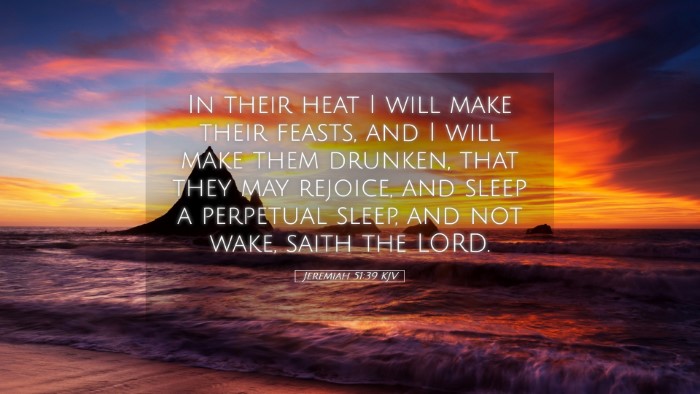Commentary on Jeremiah 51:39
Jeremiah 51:39 states: "In their heat I will make their feasts, and I will make them drunken, that they may rejoice, and sleep a perpetual sleep, and not awake, saith the Lord." This verse is part of the broader prophetic judgment concerning Babylon's impending destruction, encapsulating both divine justice and a vivid metaphorical expression of God's intervention.
Contextual Analysis
The context of Jeremiah 51 revolves around God's pronounced judgment on Babylon for its arrogance, idolatry, and oppression of God's people. The prophet uses vivid imagery to convey the totality of destruction that awaits Babylon, which serves as a warning to all nations that oppose God's will.
Insights from Public Domain Commentaries
Matthew Henry's Commentary
Matthew Henry notes the following key aspects regarding this verse:
- Divine Sovereignty: Henry emphasizes that the phrase "make them drunken" signifies God's sovereignty over the nations, using their own excesses against them. It reflects a divine strategy where God employs the very sin of Babylon—its revelry and pride—to lead to its downfall.
- Spiritual Implications: The metaphor of drunkenness illustrates spiritual stupor and moral degradation. Henry points out that such intoxication leads not only to a temporary high but also to a state of spiritual death, where the people remain oblivious to their imminent destruction.
- Perpetual Sleep: The "perpetual sleep" symbolizes the finality of God's judgment, highlighting the consequences of their sins. It indicates a state of irreversible judgment where God ceases to call them to repentance, sealing their fate.
Albert Barnes' Notes on the Bible
Albert Barnes offers additional reflections that broaden our understanding:
- Cultic Imagery: Barnes draws attention to the significance of "feasts" in the context of ancient Near Eastern culture, linking it to the idolatrous celebrations of Babylon. This aligns with other scriptural instances where feasting is both a celebration and a sinful revelry.
- Judgment as Pursuit: Barnes emphasizes that the imagery of drunkenness points to a divine pursuit of judgment, where God allows nations to indulge in their sin, ultimately leading to their destruction as a consequence of that indulgence.
- Cautionary Tale: The verse serves as a cautionary tale for contemporary readers. Barnes suggests that it reflects how God may allow societies today to pursue their hedonistic lifestyles until they face inevitable consequences, urging a return to God rather than temporal pleasures.
Adam Clarke's Commentary
Adam Clarke provides a more theological perspective:
- Symbolic Drunkenness: Clarke argues that drunkenness symbolizes not only the literal deterioration of a nation's morality but also signifies God's judgment. It illustrates how God uses the wickedness of the wicked against themselves, leading to chaos and self-destruction.
- God's Role in History: Clarke posits that God's providence is evident in the affairs of nations. He interprets the phrase "sleep a perpetual sleep" as an indication of God's sovereignty in the historical narrative, emphasizing that no kingdom can stand against divine justice.
- Hope for the Righteous: While the judgment is severe, Clarke implies that understanding God's justice offers hope to the righteous. In recognizing God's ability to deal with wickedness, believers can find confidence in his ultimate plan and the assurance of deliverance.
Theological Implications
This verse serves as a poignant reminder of the realities of divine retribution and the seriousness of obedience to God's commands. The themes extrapolated highlight:
- Moral Accountability: Nations and individuals are held to account for their actions; there is a moral order that God enforces, reminding believers that their choices bear consequences.
- Call to Repentance: The imagery serves as both a warning and an encouragement for self-examination and repentance, underscoring the importance of avoiding spiritual sleep that hinders awareness of one's relationship with God.
- The Nature of God’s Judgment: God's judgment, while righteous, also reflects His mercy and desire for repentance. The invitation to the reader is to recognize the implicit grace even amidst the prophetic announcement of doom.
Application for Today's Believers
In light of the commentary insights, this verse invites contemporary readers to reflect critically on their lives, both personally and corporately:
- Self-Examination: Believers are encouraged to evaluate their personal conduct in the light of God's standards, ensuring they do not indulge in spiritual drunkenness or complacency.
- Community Responsibility: Just as ancient nations faced judgment, modern-day communities and churches must be alert to the consequences of collective actions and moral decay.
- Hope and Assurance: Despite the somber nature of judgment, the overarching narrative of Scripture assures believers that God's purposes will prevail, giving hope amidst trials and a call to faithful service.
Conclusion
Jeremiah 51:39, through its vivid depiction of divine judgment, challenges believers to remain vigilant and faithful in their walk with God. The insights from esteemed commentaries provide a deep and multifaceted understanding of the text, affirming its relevance across time and theology. Pastors, students, and theologians are urged to contemplate the serious implications of this scripture, drawing lessons that resonate with the call of God in their lives today.


